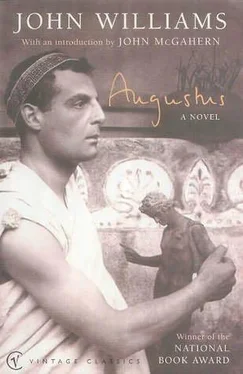John Williams - Augustus
Здесь есть возможность читать онлайн «John Williams - Augustus» весь текст электронной книги совершенно бесплатно (целиком полную версию без сокращений). В некоторых случаях можно слушать аудио, скачать через торрент в формате fb2 и присутствует краткое содержание. Жанр: Историческая проза, на английском языке. Описание произведения, (предисловие) а так же отзывы посетителей доступны на портале библиотеки ЛибКат.
- Название:Augustus
- Автор:
- Жанр:
- Год:неизвестен
- ISBN:нет данных
- Рейтинг книги:3 / 5. Голосов: 1
-
Избранное:Добавить в избранное
- Отзывы:
-
Ваша оценка:
- 60
- 1
- 2
- 3
- 4
- 5
Augustus: краткое содержание, описание и аннотация
Предлагаем к чтению аннотацию, описание, краткое содержание или предисловие (зависит от того, что написал сам автор книги «Augustus»). Если вы не нашли необходимую информацию о книге — напишите в комментариях, мы постараемся отыскать её.
Augustus — читать онлайн бесплатно полную книгу (весь текст) целиком
Ниже представлен текст книги, разбитый по страницам. Система сохранения места последней прочитанной страницы, позволяет с удобством читать онлайн бесплатно книгу «Augustus», без необходимости каждый раз заново искать на чём Вы остановились. Поставьте закладку, и сможете в любой момент перейти на страницу, на которой закончили чтение.
Интервал:
Закладка:
Let me try to demonstrate what I mean by an example.
All Rome is aflutter with the news of the latest law enacted by the Senate, which by a recent edict of Octavius Caesar has been reduced to some six hundred members. It is, in short, an effort to codify the marriage customs of this odd country, customs which have in recent times been more nearly acknowledged by abandonment than adherence. Among other things it gives to freed slaves more rights of marriage and property than they have had before, and that has caused some grumbling in certain quarters; but such grumblings are drowned by the cries of outrage at the more startling parts of the law, of which there are two. The first forbids any man who is or will be eligible by reason of his wealth to become a senator, to marry a freed-woman, an actress, or the daughter of an actor or actress. Nor shall the daughter or granddaughter of one of senatorial rank marry a freedman, an actor, or the son of one of those in the acting profession. No freeborn man, regardless of rank, shall marry a prostitute, a procuress, anyone convicted of a criminal act, one who has been an actress-or any woman who has been apprehended and convicted of adultery, regardless of her rank.
But the second part of the law is even more drastic than the first; for it provides that any father who apprehends an adulterer of his daughter in his own home, or the home of his son-in-law, is permitted (though not required) to kill the adulterer without fear of reprisal, and is permitted to do the same to his daughter. A husband is permitted to kill the offending man, but not his wife; in any event, he is required to denounce the offending wife and divorce her, else he may be prosecuted himself as a procurer.
As I say, all Rome is aflutter. Lampoons are circulated wildly; rumors abound; and each citizen has his own notion of what the whole thing means. Some take it seriously; some do not. Some say that it ought to be called the Livian rather than the Julian Law, and suspect that somehow Livia managed to insinuate it behind Octavius Caesar's back, in revenge for his own liaison with a certain lady who is also the wife of his friend. Others attribute it to Octavius himself; and of those, his enemies pretend outrage at his hypocrisy, others are heartened by what they see as the re-establishment of the "old virtues," and yet others see it as some obscure plot on the part of either Octavius Caesar or his enemies.
Through all the uproar, the Emperor himself walks calmly, as if he had no notion of what anyone was saying or thinking. But he does know. He always knows.
That is one side of the man.
Yet there is another. It is one that I, and a few of his friends know. It is unlike the one that I have shown you.
Upon formal occasions, I have been guest in his home on the Palatine, where Livia reigns. These occasions have been pleasant and not at all strained; Octavius and Livia behave toward each other with perfect civility, if not warmth. Upon other occasions I have been guest at the home of Marcus Agrippa and Julia while Octavius was present, usually in the company of Terentia, the wife of Gaius Maecenas. And upon several intimate and casual occasions I have been guest at the home of Maecenas himself, also in the presence of Octavius and Terentia. The three of them behave toward each other with the ease of old friendship.
Yet his liaison with Terentia is known to all, and has been for several years.
And there is more. Almost like a philosopher, he is without faith in the old gods of his countrymen; yet almost like a peasant, he is extraordinarily superstitious. He will use the auguries of his priests to any purpose that seems convenient to him, and be convinced of their truth because of his successful use of them; he will scoff (in a friendly fashion) at what he calls the "transcendent pomposity" of the God of my countrymen, and wonder at the sloth of a race that can invent only one god. "It is more fitting," he said once, "for the gods to be many, and to strive among themselves, as men do… No. I do not believe that the strange God of your Jews would do for us Romans." And once I chided him (we have become that friendly) for his faith in portents and dreams, and he replied: "Upon more than one occasion my life has been saved by my believing what my dreams told me. Once it is not saved, I shall cease believing in them."
In all things, he is the most prudent and cautious man, and will leave nothing to chance that may be gained by careful planning; yet he loves nothing more than to play at dice, and will willingly do so for hours upon end. Several times he has sent a messenger to me, inquiring of my leisure; and I have played with him, though I take more pleasure in observing my friend than I do in the silly game of chance we play. He is utterly serious when he plays, as if his Empire depended upon the turn of the pieces of bone; and when, after two or three hours of play, he has won a few pieces of silver, he is as pleased as if he had conquered Germany.
He confessed to me once that in his youth he had aspired to be a man of letters, and had written poems in competition with his friend Maecenas.
"Where are the poems now?" I asked him.
"Lost," he said. "I lost them at Philippi." He seemed almost sad. Then he smiled. "I even wrote a play, once, in the Greek fashion."
I chided him a little. "Upon one of your strange gods?"
He laughed. "A man," he said, "only a foolish man who was too proud, that Ajax who took his life with his sword."
"And is that, too, lost?"
He nodded. "In my modesty, I took his life again-with my eraser… It wasn't a very good play. My friend Vergil assured me that it was not."
We were both silent for a moment. A sadness had come over Octavius's face. Then he said almost roughly: "Come. Let's have another game." And he shook the dice and threw them on the table.
Do you see what I mean, my dear Strabo? There is so much that is not said. I almost believe that the form has not been devised that will let me say what I need to say.
X. Letter: Quintus Horatius Flaccus to Octavius Caesar (17B. c.)
You must forgive me for returning your messenger without reply to your invitation. He made it clear that you had bidden him wait upon me; I returned him to you upon my own responsibility.
You ask me to compose the choral hymn for the centennial festival that you have decreed this May. You know that I am flattered that you should think me worthy; we both know that the man who should have had the honor is dead; and I know how deeply important you consider this celebration to be.
Thus, you are no doubt puzzled at my uncertainty about accepting the commission, an uncertainty that has given me a sleepless night. I have at last concluded that it is my duty and my pleasure to accede to your wish; but I think you ought to know the considerations which occasioned my hesitation.
Please know that I understand the difficulty of your task in running this extraordinary nation that I love and hate, and this more extraordinary Empire at which I am horrified and filled with pride. I know, better than most, how much of your own happiness you have exchanged for the survival of our country; and I know the contempt you have had for that power which has been thrust upon you-only one with contempt for power could have used it so well. I know all these things, and more. Thus, when I venture a disagreement with you, I do so in the full knowledge of the wisdom which I confront.
Yet I cannot persuade myself that your new laws will bring anything but grief to yourself and your country.
I know the corruption of our city which you would stem, and I know the intent of the laws, I believe. In the circles in which you move, and which I observe, copulation has become an act designed to obtain power, either social or political; an adulterer may be more dangerous than a conspirator, both to your person and his country; and that act whose natural end is affectionate pleasure has become a dangerous means toward ambition. The slave may gain power over a senator, thus over the ordinary citizen, and at last justice is subverted. I know these things, which your laws would hope to prevent.
Читать дальшеИнтервал:
Закладка:
Похожие книги на «Augustus»
Представляем Вашему вниманию похожие книги на «Augustus» списком для выбора. Мы отобрали схожую по названию и смыслу литературу в надежде предоставить читателям больше вариантов отыскать новые, интересные, ещё непрочитанные произведения.
Обсуждение, отзывы о книге «Augustus» и просто собственные мнения читателей. Оставьте ваши комментарии, напишите, что Вы думаете о произведении, его смысле или главных героях. Укажите что конкретно понравилось, а что нет, и почему Вы так считаете.











